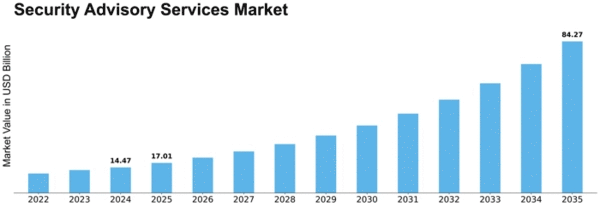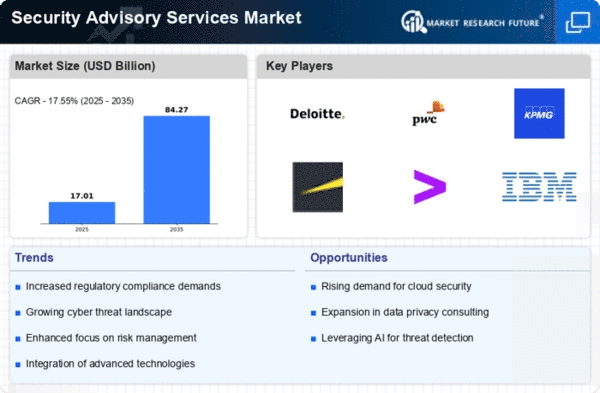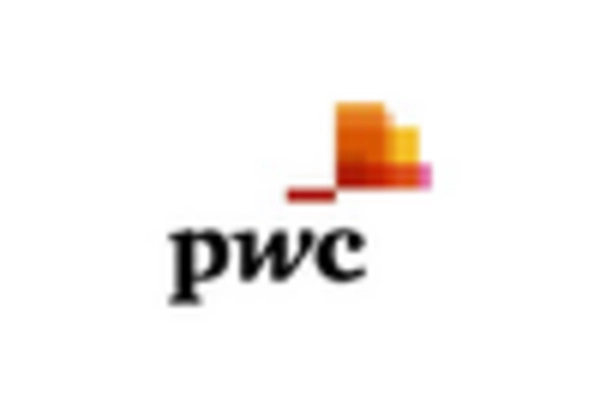Security Advisory Services Size
Security Advisory Services Market Growth Projections and Opportunities
The security advisory services market is experiencing dynamic shifts driven by a multitude of factors reshaping its landscape. With the ever-evolving threat landscape and increasing cyberattacks targeting organizations of all sizes and industries, the demand for expert guidance and strategic counsel on cybersecurity matters has never been higher. Security advisory services play a crucial role in helping businesses assess their security posture, identify vulnerabilities, and develop comprehensive strategies to mitigate risks and protect their assets.
One key driving force behind the evolving market dynamics is the growing complexity of cybersecurity threats and regulatory requirements. Cybercriminals are becoming more sophisticated in their tactics, techniques, and procedures, posing significant challenges for organizations to defend against cyberattacks effectively. Moreover, the regulatory landscape is constantly evolving, with stringent data protection laws, such as GDPR and CCPA, imposing hefty fines for non-compliance. In response, businesses are turning to security advisory services to navigate the complex regulatory landscape, ensure compliance, and safeguard sensitive data.
Moreover, the proliferation of digital transformation initiatives and cloud adoption is driving the demand for security advisory services. As organizations migrate their infrastructure, applications, and data to the cloud, they face new security challenges associated with shared responsibility models, data sovereignty, and access controls. Security advisory services help organizations assess the security implications of cloud migration, design secure cloud architectures, and implement best practices for data protection and compliance.
Furthermore, the COVID-19 pandemic has accelerated the digitalization of business processes and remote work arrangements, further increasing the demand for security advisory services. With employees working from home and accessing corporate networks from personal devices and unsecured networks, organizations are facing heightened cybersecurity risks. Security advisory services provide organizations with guidance on implementing secure remote work solutions, conducting risk assessments, and enhancing security awareness training to mitigate the risks associated with remote work.
Additionally, the shortage of cybersecurity talent and expertise is driving organizations to seek external assistance from security advisory firms. The cybersecurity skills gap has become a pressing concern for businesses, with a shortage of qualified professionals capable of addressing the growing complexity of cyber threats. Security advisory services offer organizations access to a team of experienced cybersecurity professionals with diverse skill sets and expertise in various domains, including threat intelligence, incident response, and compliance.
Moreover, the increasing adoption of emerging technologies, such as IoT (Internet of Things), AI (Artificial Intelligence), and blockchain, is driving the need for specialized security advisory services. These technologies introduce new security risks and challenges, such as device vulnerabilities, data privacy concerns, and malicious AI attacks. Security advisory services help organizations assess the security implications of adopting these technologies, identify potential threats and vulnerabilities, and develop strategies to mitigate risks and ensure secure deployments.
Furthermore, the rise of nation-state-sponsored cyberattacks and advanced persistent threats (APTs) is driving organizations to seek proactive security advisory services to defend against sophisticated adversaries. Nation-state actors and APT groups are targeting organizations across industries, seeking to steal intellectual property, disrupt operations, and undermine national security. Security advisory services offer organizations threat intelligence, security assessments, and incident response planning to detect and respond to cyber threats effectively.



















Leave a Comment